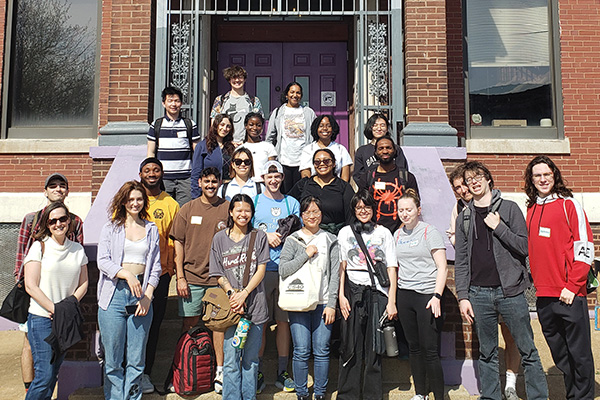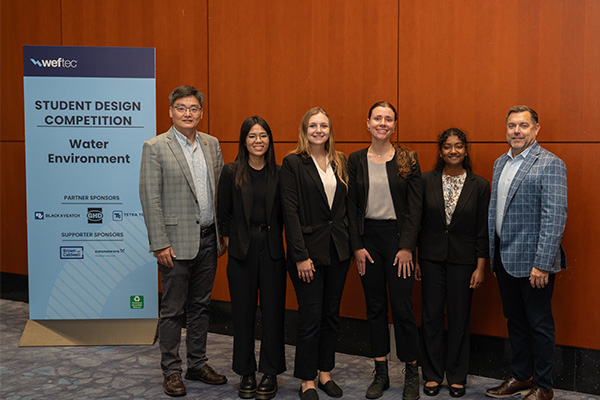Engineering students take close look at St. Louis community
McKelvey Engineering students learn what it means to be “In St. Louis, For St. Louis”

Students in Tucker Krone’s class in the McKelvey School of Engineering at Washington University in St. Louis didn’t spend their spring break on the beach or ski slopes. They stayed in St. Louis visiting with various organizations throughout the community that brought them new perspectives on many of the social issues they will grapple with in their career.
The community-engaged course Krone teaches, “Engineers in the Community,” covers the content of the course sequence that includes “Engineering Ethics,” “Engineering Leadership and Team Building,” and “Conflict Management and Negotiation.”
“The course gives engineering students a combination of civics lessons, community empowerment and diversity education,” Krone said. “It is coded as a social science, but we try to weave through the idea of what does community mean?”
For the “Engineers in the Community” students interacted with representatives from local nonprofit organizations, including EarthDance Organic Farm in Ferguson, Arch City Defenders, Integrated Health, the Delmar Divine and the Ferguson Community Empowerment Center. These and other nonprofits partnered with the class to complete projects.
The immersion experience began with a bus tour of St. Louis, led by Robert Hansman, an activist and associate professor of architecture at WashU. Using more than two decades experience working in the city, his cultural, social and historical knowledge was shared with visitors as they traveled to a wide range of locations throughout St. Louis. The tours teach passengers about racial equity by visiting various organizations, neighborhoods, museums and historic sites.
Students also visited the George B. Vashon Museum of African American History and the and Griot Museum of Black History, each of which framed St. Louis’ history with stories of the politicians, scientists, athletes, and media personalities who made an impact.
In addition, students also got to experience some local delicacies from Crown Candy Kitchen, Balkan Treat Box, Deli Divine and Earthbound Brewery.
Following the immersion week, students will give video presentations of their projects related to the nonprofits.
“The course is special because our engineering students get out of dark basements doing problem sets or working on coding projects and engaging with St. Louis beyond the Delmar Loop. They get to see places that they do not normally get to,” said Krone, who earned a bachelor’s degree in biomedical engineering in 2012 from the Engineering school at WashU.
Krone also cited a memorable experience the group had while visiting the Ferguson Community Empowerment Center.
“We had an awe-inspiring surprise visit from Michael Brown's father, Michael Brown Sr.,” Krone said. “It was amazing to hear from him. It was completely unplanned.”
The inspiration Krone experienced was shared by his students, including Farruh Nabiyev, a dual-degree student majoring in environmental engineering.
“As a human being it’s important to keep your humanity,” Nabiyev said. “However, as engineering students we are exposed to heavy amounts of facts and objective truths formed by numbers and figures. Through the STEM education process, we lose that human perspective. This class made me realize that it’s important to keep the surrounding community in mind, and the work we are doing will always affect people.”
Nick Harris, a junior majoring in mechanical engineering, reflected on his experiences.
“The most meaningful part of the class has been meeting the people who live here in St. Louis and hearing their stories,” Harris said. “I did not know much about the areas we visited, and that has changed. Knowing the pain and hope that people have, the course has given to me understanding the importance of building with the people affected in mind.”
Mercy Olatunde, a junior majoring in computer science, said she came away with some new ideas, as well.
“The most meaningful thing I learned was that the decisions engineers make have a profound impact on people's lives,” Olatunde said. “Also, being inclusive to individuals with nontraditional paths to college and effectively communicating the problem, needs and proposed solutions were emphasized.”
For Krone, “Engineers in the Community” is a personal mission to educate future engineers and build better communities.
“There are a lot of stigmas about these communities,” Krone said. “When you go there, you realize it just about meeting a bunch of nice people. Sometimes, they haven't had access to the same resources as other parts of the city, but recognizing their agency and why they love where they live and why is important. It is about demystifying these neighborhoods and showcasing the humanity of the people who live and work there.”




